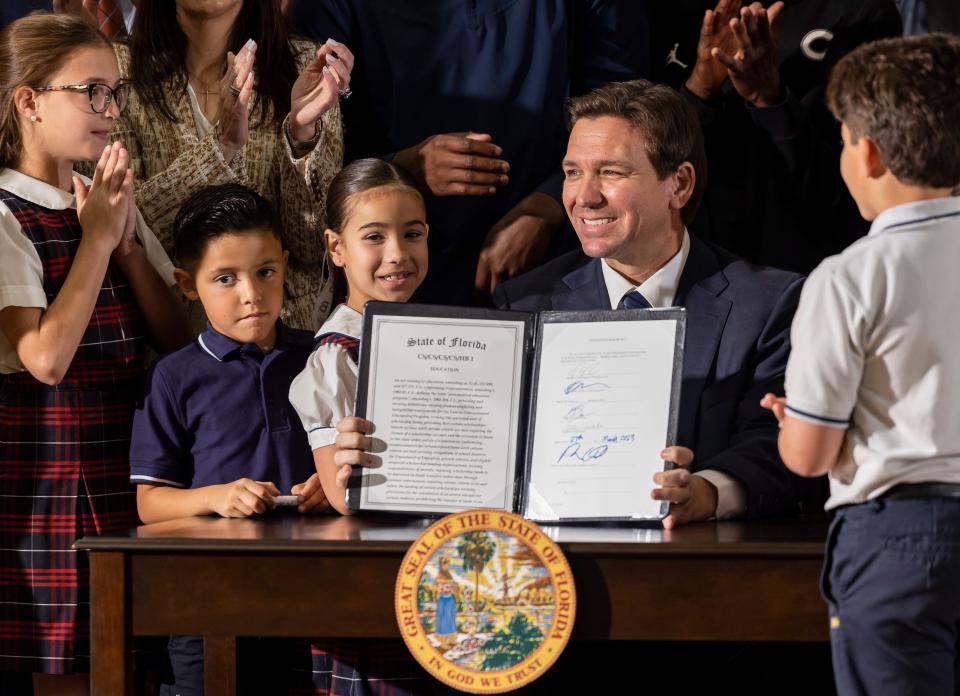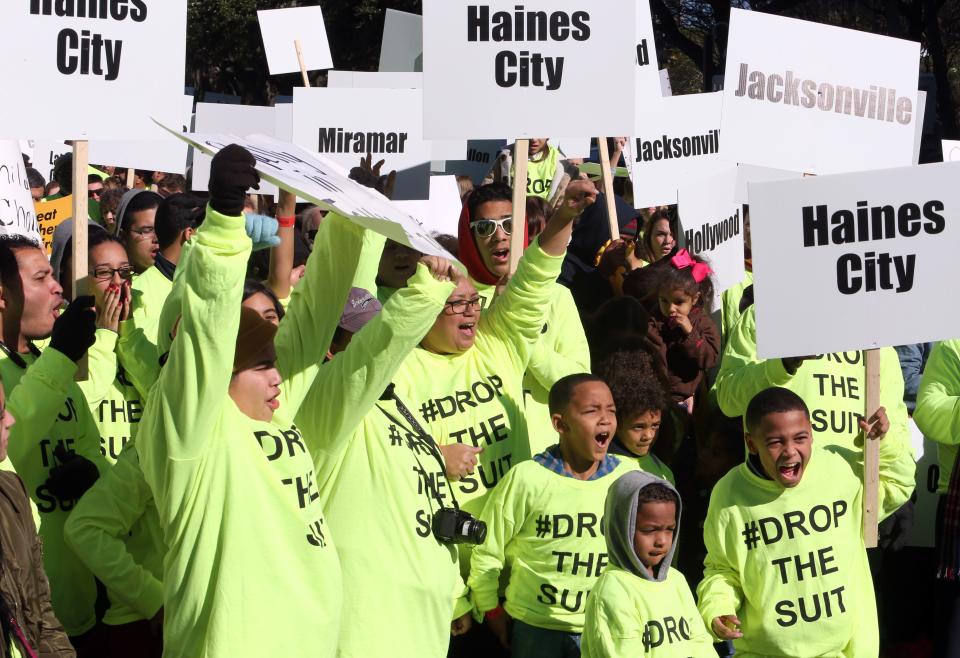Record number of Florida students cash in on school vouchers; could cost $2.5 billion
This fall will mark the first year Florida families don’t have an income requirement to qualify for a school voucher, and many are cashing in.
As of mid July, about 240,000 income-based scholarships have been awarded to students so far for the 2023-2024 school year compared to the approximately 170,000 that were given out last year, according to Step Up for Students, a state-approved scholarship funding organization.
“There’s a lot of excitement out there. We’re still getting a couple thousand applications a day,” said Doug Tuthill, president of the non-profit.
With the state’s median funding at $7,775 per student, this adds up to an increase of about $519 million heading to private schools this year.
Some school districts are losing students and the money that comes with them as a result of the state’s most recent expansion of its voucher programs. More worrisome, however, is what this could mean for the state’s public school system, said Andrew Spar, president of the Florida Education Association.
“What's the financial impact if the very large number of students already in private schools and homeschool take those vouchers, and it exceeds what the legislature allocated?” asked Spar.
So far, the increase of $519 million doesn't push the state into the red and stays in line with the projected $3 billion the state has for its voucher programs.
But critics of the voucher expansion aren't convinced that the state has enough money for recurring funding, especially if more students use scholarships every year.
Rep. Robin Bartleman, D-Weston, worries Florida might have to dip into its reserves in the future.
"You're using one time money for recurring expenses, and what happens next year? And what happens to the public schools that follow the letter of the law and have accountability and have degreed teachers and have armed guardians?" asked Bartleman.
"What happens when we're in a budget year that we're not flush with money?" she added.
Tuthill says opponents of the program should get used to school choice vouchers being a part of the mainstream school experience.
"It’s not going to go away. Families aren’t going to stop fighting for their kids," he said. “We need to manage it like that. It’s going to continue to grow. At some point it needs to be a normal part of our public education. People need to see it as another option just like magnet schools and charter schools.”
$2.5 billion to private schools?
Family Empowerment Scholarships are taxpayer funded, while the Florida Tax Credit program is privately funded by corporate donors. As of February of this year, the maximum amount of money the state could give out for tax credit scholarships this year was $1.09 billion, according to the Florida Department of Education’s last quarterly report.
Add that to the Legislature’s allocation of about $2 billion for Family Empowerment Scholarships, and there’s approximately $3 billion stored away for vouchers for this year. HB1 dictates the state use the tax credit money first.
The Family Empowerments Scholarships have two branches, one for parents wanting educational options outside the public school system and the other for parents of kids with disabilities.
While scholarships vary by grade level and county, the average child receives between $7,430 and $8,120 from either tax credit or FES-Educational Options funds to attend a private school, said Patrick Gibbons, a spokesperson for Step Up for Students.

For the FES-Unique Abilities, a grant for students with disabilities, the state allocates about $10,000 per student. As of mid-July, Step Up for Students has awarded 68,379 of those scholarships, Gibbons said.
In total, the school choice group expects to enroll 325,000 students in the state’s three main scholarship programs.
The state won't know the exact amount of of money used for scholarship funds until October, when the Florida Department of Education certifies its full-time equivalent student survey, which counts how many students are attending public schools.
Currently, however, with a combination of 240,291 tax credit and Educational Options students with a median of $7,775 a scholarship and 68,379 Unique Abilities students enrolled, this year’s voucher expansion could theoretically cost $2.5 billion, according to the Florida Policy Institute.
Gov. Ron DeSantis, who is campaigning to be the Republican nominee for president, signed HB 1, which removed the income requirement for families to qualify for school choice vouchers. The universal voucher bill was the largest expansion of school choice in Florida's history and the U.S., DeSantis said.
“The state of Florida is number one when it comes to education freedom and education choice,” DeSantis said at the bill signing in Miami. “Today’s bill signing cements us in that number one position.”
During this year's legislative session, Democrats and opponents of the law argued the expansion could cost the state about $4 billion dollars if every student who qualified for a voucher used one.
The Florida Policy Institute, a progressive research organization, estimated it would cost $1.9 billion if 75% of students currently enrolled in a private school cashed in a voucher.
In the state's budget for this year, there is up to $350 million in reserves school districts could use if vouchers exceed the approximately $3 billion allocated for income-based scholarships.
"A recession will come one day, and that legislature, don't know if its going to be the same folks in those seats, but will they be able to say no to the wealthiest people in the state who are receiving vouchers?" asked Holly Bullard, chief strategy and development officer for the institute. "How are we setting ourselves up for success or failure for future education budgets?"

Step Up for Students President Tuthill believes the program will grow by an estimated 75,000 kids this year, but it will be mitigated by the number of seats in private schools. He said he's heard from families who have been awarded scholarship funds but cannot find open space in a private school.
"Supply isn’t keeping up with demand," he said. "It's probably going to take a couple of years to see the full impact of HB1."
Vouchers around the state
Since DeSantis was elected, the Republican-led Legislature has made it a priority to expand school choice by increasing the income eligibility, removing requirements and including more schooling options, like stipends for homeschool and transportation.
The top five districts with the most students using income-based vouchers are Miami-Dade, Broward, Orange, Hillsborough and Duval, according to Step Up for Students.
In Duval, about $88 million went to students for income-based scholarships, according to the district. For this fall, the estimated funding is $124,439,801, the district said in an email.
Leon County expects a $4 million increase in state and tax credit funds going directly to private schools, wrote spokesperson Chris Petley in an email.
In Indian River County, the district is projecting a 102% increase in the number of students using the Family Empowerment Scholarship for the 2024 fiscal year, according to school district reports. About 1,118 students are expected to use the scholarship, compared to 554 students in the 2022-2023 school year.
St. Lucie County expects a loss of $30,740,429 from the state's public school funding for Family Empowerment Scholarships, said Lydia Martin, spokeswoman for St. Lucie Public Schools.
"The lost revenue impacts us each year and it has a greater impact on operations as it increases. Students are able and welcome to return to us at any time but depending on the time of year, the funds are not always restored," Martin said.
During the 2022-2023 school year, the average family income of a student who was awarded an income-based scholarship was $42,795, according to Step Up for Students.
Private schools who receive the money can include religious schools, too. In Leon County, for example, about half of the schools that receive Family Empowerment Scholarships for Educational Opportunities are religious.
But private schools can also choose not to accept vouchers.
Currently, HB1 does not require schools that accept school choice vouchers to follow the same accountability standards that public schools do. For example, private schools do not have to take the Florida Assessment of Student Thinking tests and are not required to comply with the Stop WOKE Act and the Parental Rights in Education law.
Still, some of Florida's most prestigious private schools, like The Bolles School in Jacksonville and the Pine Crest School in Fort Lauderdale do not accept Family Empowerment Scholarships — Pine Crest's website states federal and state scholarships impose "significant obligations" to the school.
In Tallahassee, the Maclay School states they will not accept funding related to HB1 because it does not want to be forced into oversight, mandates, reporting or audits required with school vouchers.
"As a co-educational school serving grades PreK-12, we take pride in our status as an independent school, determining our curriculum, program, experiences, and efforts to do 'what’s best for students,' the website reads.
Colleen Wixon, education reporter for TCPalm, contributed to this story. Contact her at colleen.wixon@tcpalm.com.
Ana Goñi-Lessan is the State Watchdog Reporter for USA TODAY- Florida and can be reached at AGoniLessan@tallahassee.com. Follow her on Twitter @goni_lessan.
This article originally appeared on Tallahassee Democrat: Florida school vouchers: Record student count may cost $2.5 billion

